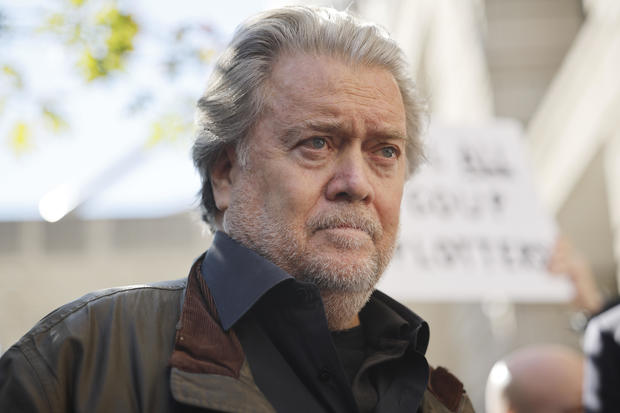When Steve Bannon was indicted on fraud and money laundering charges in September, the former Trump adviser claimed he was the target of a politics-driven prosecutor.
Bannon said the Manhattan district attorney “decided to pursue phony charges against me 60 days before the midterm election,” implying the criminal case against him was designed to sway the nation’s vote.
Trump has made similar claims about Manhattan D.A. Alvin Bragg, publicly accusing him of bias for a tax fraud case against Trump’s company. But when lawyers for the Trump Organization signaled they might make a similar argument during the company’s recent trial, they were quickly shut down by the judge presiding over the case.
“I will not allow you in any way to bring up a selective prosecution claim, or claim this is some sort of novel prosecution,” Judge Juan Merchan said on Sept. 12, limiting both sides in the Trump Organization trial to arguments focused on the law.
That same judge is presiding over Bannon’s case, which is expected to go to trial in November 2023.
Getty Images
Bannon was charged on Sept. 8 for his role in a group that raised millions promising to privately build a wall along the U.S.-Mexico border, but allegedly pocketed funds instead. Bannon had faced similar federal charges in 2020 but was pardoned by Trump during the final hours of his presidency. Presidential pardons do not apply to state charges, such as the ones filed by the Manhattan D.A.
In the Trump Organization trial, two branches of the company were found guilty on Dec. 6 of a combined 17 counts related to criminal tax fraud. An attorney for the corporation, Susan Necheles, said the judge’s restriction against arguing political bias hampered the defense.
She said Bannon is likely to face similar limitations.
“These are political cases. They wouldn’t have been brought if they weren’t political cases, you know, and it’s like the elephant in the room,” Necheles said. “You’re not allowed to talk about it, but there’s a reason why this case was brought.”
Necheles noted that during jury selection, many potential jurors — and some who were ultimately selected to decide the case — expressed strong opinions about Trump.
Just before opening statements on Oct. 31, Bragg praised Merchan, saying he “runs an efficient courtroom.”
That was apparent during early hearings in both the Trump Organization and Bannon proceedings, when Merchan made rulings designed to limit the defenses’ ability to drag the cases out.
In the Trump Organization case, during an at-times testy pretrial hearing on Sept. 12, Merchan told Necheles and other attorneys that he was determined to start the trial on time.
“One of the accusations is that the defense is trying to stall, you know, it’s starting to feel that way a little bit,” Merchan said.
In Bannon’s case, Merchan has already rejected efforts to extend the time before trial.
On Oct. 4, Bannon’s attorneys asked for a year to go through four terabytes of data and documents collected by prosecutors, before filing their first motions in the case. Merchan gave them four months. He laid out a schedule, including discovery — the process by which the two sides exchange information — that would have the case ready for trial in a year.
And in case Bannon’s side might want to draw out discovery, there’s a cautionary note from the Trump Organization case they might want to heed: In a recently unsealed decision from October 2021, Merchan held the company in contempt for failing to comply with prosecutors’ subpoenas.
Bannon is scheduled to appear before Merchan on Jan. 12 for a hearing on discovery. Reached by phone, his attorney John Mitchell declined to discuss the hearing, saying he did not want to violate a Sept. 19 order by the judge, broadly restricting public disclosure of information related to discovery.
“I really am not at liberty to discuss these things. We have some rather strong protective orders in place and I’m not entirely sure what I can say,” Mitchell said.
